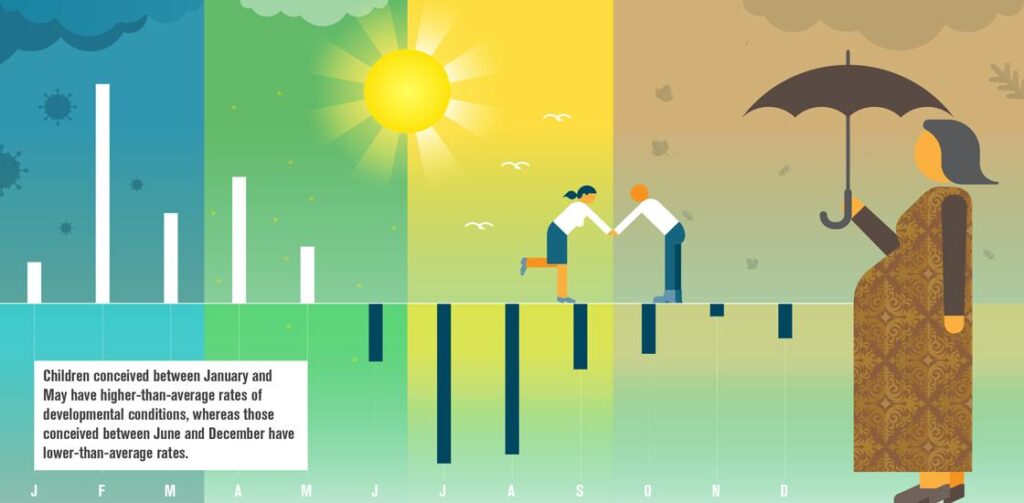A recent study conducted in Japan has unveiled intriguing findings regarding the impact of the season in which babies are conceived on their long-term health outcomes. The research suggests that infants conceived during the winter months may have a lower risk of becoming obese adults compared to those conceived in other seasons. This groundbreaking insight raises important questions about the interplay between environmental factors and human development, potentially offering new avenues for obesity prevention strategies. As global rates of obesity continue to rise, understanding the nuances of prenatal influences could play a crucial role in tackling this pressing public health issue. The findings of this study, published in the South China Morning Post, provide a compelling addition to the ongoing discourse surrounding childhood obesity and it’s lifelong effects.
Impact of Seasonal Conception on Long-Term Health Outcomes
Recent research has illuminated potential links between the season of conception and long-term health outcomes, especially concerning obesity. A study conducted in Japan analyzed data correlating the time of year babies were conceived with their body weight in adulthood. The findings indicate that individuals conceived during the winter months show a lower likelihood of becoming obese, suggesting that environmental factors during pregnancy may play a meaningful role in metabolic and developmental processes. This association might potentially be influenced by varying levels of nutrition, maternal health, and seasonal shifts in lifestyle that impact fetal development.
Key Insights from the Study:
- Winter Conception: Babies conceived in winter were observed to have healthier weight profiles as they reached adulthood.
- Seasonal Variability: Differences in dietary patterns, exercise habits, and sunlight exposure during pregnancy may contribute to this phenomenon.
- Public Health Implications: Understanding these connections can help in creating targeted interventions for obesity prevention based on parental conception times.
| Season of Conception | Percentage of Adults Classified as Obese |
|---|---|
| Winter | 28% |
| Spring | 34% |
| Summer | 31% |
| Autumn | 36% |
This compelling evidence adds a new dimension to the understanding of obesity’s origins, highlighting the need for further investigation into how seasonal factors may influence health outcomes. Researchers emphasize the importance of considering not just genetic predispositions, but also environmental contexts that shape the life course of individuals from their very inception. As public health advocates seek to mitigate the growing obesity crisis,these findings could guide future strategies that incorporate timing of conception in parental advisories and health planning.
Understanding the Mechanisms Behind Winter Conception and Obesity
Recent research from Japan reveals fascinating insights into the correlation between the time of conception and future obesity rates in children. The study suggests that babies conceived during the winter months are considerably less likely to become obese as adults compared to those conceived in other seasons. This phenomenon may be attributed to various environmental and physiological factors that affect fetal development during winter, such as changes in maternal nutrition, physical activity levels, and exposure to sunlight and vitamin D. These conditions can shape the metabolic programming in utero, potentially resulting in healthier weight trajectories as these individuals grow.
To better understand the underlying mechanisms, several factors are hypothesized to contribute to this association:
- Seasonal Nutrient Availability: Winter conditions may lead mothers to consume diets rich in essential nutrients that support healthy fetal growth.
- Physical Activity Patterns: During winter, there may be a natural tendency for mothers to engage in less vigorous activity, leading to a protective metabolic environment for the developing fetus.
- Sunlight Exposure: Reduced sunlight in winter months could impact vitamin D levels, which have been linked to metabolic health.
An fascinating aspect of the study included the demographic background of participants, which may have influenced outcomes.The table below highlights some key findings categorizing the impact of conception timings on obesity rates:
| Conception Month | Percentage of Obesity in Adulthood |
|---|---|
| Winter (Dec-Feb) | 12% |
| Spring (Mar-May) | 18% |
| Summer (Jun-Aug) | 20% |
| Fall (Sep-Nov) | 16% |
Through this lens, researchers aim to unravel the complexities of how seasonal factors intertwine with human biology in ways previously unconsidered, potentially informing future public health strategies aimed at combating obesity.
Practical Implications for Parents and Health Policy Makers
For parents, understanding the implications of seasonal conception can be pivotal in guiding choices about family planning and health. This recent study from Japan highlights a potential correlation between the season of conception and long-term health outcomes, such as body weight in adulthood. Parents should consider the following aspects when planning for a family:
- Timing Matters: Explore the benefits of conceiving during winter months.
- Health Awareness: Monitor nutrition and lifestyle during pregnancy.
- Community Support: Engage with healthcare providers for tailored advice based on emerging research.
Health policy makers also play a critical role in addressing these findings and framing educational initiatives. Policy emphasis could focus on integrating seasonal factors into maternal health programs. Effective strategies may include:
- Public health Campaigns: Raising awareness about the potential impacts of seasonal conception on child health.
- Research Funding: Support for studies exploring seasonal influences on health outcomes.
- Educational Resources: Development of programs aimed at informing parents about the findings and recommendations for healthier conception choices.
To Conclude
the findings from the recent Japanese study shed light on the intriguing link between the season of conception and long-term health outcomes,particularly obesity. As scientists continue to unravel the complexities of human development,this research emphasizes the significance of environmental factors during the early stages of life. With winter-conceived babies showing a reduced likelihood of becoming obese adults,the study opens up new avenues for understanding the biological and environmental influences that shape our health. As the global obesity epidemic persists, such insights could inform preventive strategies and health policies aimed at fostering a healthier future for children. As researchers delve deeper into this seasonal phenomenon,the implications of these findings may extend beyond Japan,prompting further investigation into the intricate relationship between conception timing and lifelong health.
